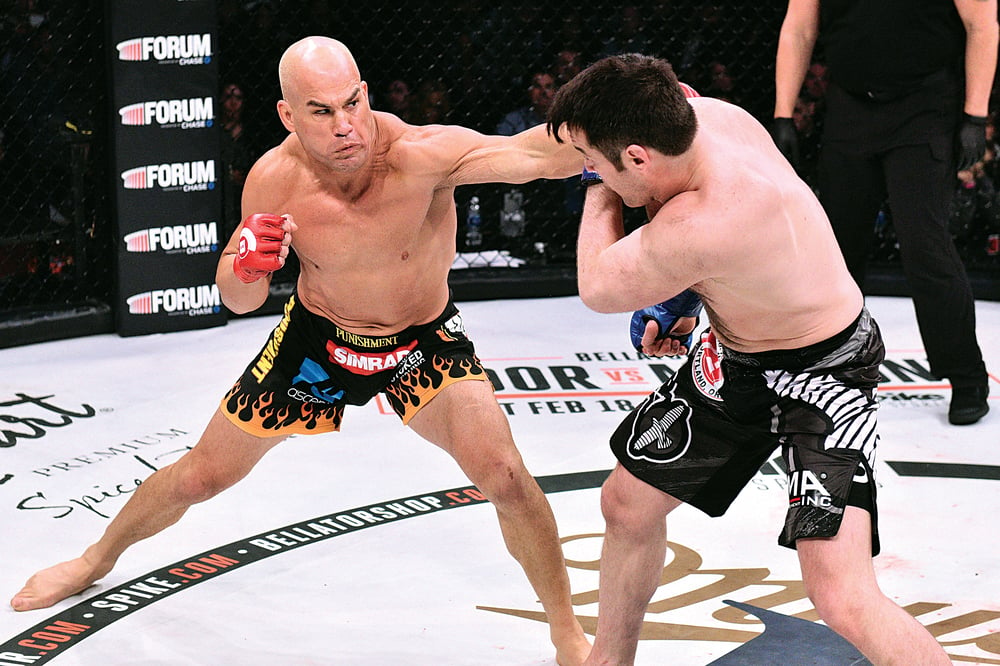
Issue 154
May 2017
Tito Ortiz was one of MMA’s first true superstars and has blazed a trail for the sport for 20 years.
Very few fighters in the history of mixed martial arts have left an impression like the former ‘Huntington Beach Bad Boy’.
A one-man brand, Tito Ortiz’s long reign as UFC light heavyweight champion, from April 2000 to September 2003, was a record for more than a decade.
In the early to mid-2000s, Tito was the biggest pay-per-view draw in the sport, thanks largely to his infamous rivalries with Chuck Liddell and Ken Shamrock.
And while some suggest he extended his career too long, somehow fighting on after more back surgeries than even he can recall, eventually signed off in style at the beginning of this year.
In January, the 42-year-old’s rapid first-round submission of Chael Sonnen brought him his 19th win in a Hall of Fame career spanning two decades.
He’s been the hero, the villain and everything in between during his time inside the cage. When all is said and done, Tito will be remembered for being a guy who, despite some terrible injuries, never backed down from a challenge and always gave everything to the sport and the fans.
“I just want to offer a big thanks to all my fans, the ones who stuck with me throughout my career,” Tito tells. “They played a part in putting me here. I think 50% is down to me, but 50% is down to the fans, who have supported me over many years through thick and thin.
"There’s been a lot of people who jumped on the bandwagon too, but I always had a big loyal group of fans also, who stood by me during the wins and when I lost.
"And it’s those I want to thank most: the true fans.
“I feel like I’ve been on one hell of a journey. I feel like everything there is to experience in this sport, I’ve done. From the highest high to the lowest low. I’ve had the injuries, I’ve had the successes and I’m thankful for all of it.
"I am thankful for the skills that were given to me and for the opportunities I got along the way.”
A talented college wrestler, Ortiz discovered MMA at just the right time.
He admits it likely saved him from a life of drugs and crime, similar to the one which had torn his family apart during his youth.
He turned pro in 1997 with a 31-second TKO at UFC 13 and didn’t look back.
After unsuccessfully challenge Frank Shamrock for the light heavyweight belt in just his sixth pro fight, Tito claimed the title in his next outing against Wanderlei Silva at UFC 25 in Japan before embarking on the golden period of his career.
According to ‘The People’s Champion’, however, UFC 40 would also be the last time he would ever step into the Octagon injury-free.
The then record five-defense reign came crumbling down. His first back injury was followed by a unanimous points defeat to Randy Couture at UFC 44 in September 2003.
Then, for the next nine years, he was in a constant battle with his toughest opponent – his flesh and bone.
“Through my whole career, my worst opponent was myself, my own body.
"Despite all these injuries, man, I was able to bounce back and fight again. Finding the motivation to do that, to keep coming back, that was my biggest challenge. That was definitely my toughest opponent.”
Despite the knocks, the surgeries and the setbacks, he stuck around. Although it was physically impossible to maintain the same level of competitiveness that he enjoyed in his pomp, Ortiz still took on the best fighters in the world.
Critics said he should retire years ago, but he kept fighting and had the perfect swansong.

He upset the odds to submit Chael Sonnen and got a hero’s send off in Bellator when he left his gloves in the cage.
“I came through some major surgeries and fought again when I was told I never would. The injuries never retired me either, I retired because I was done. I put 20 years of my life into the sport and I’m proud that I was able to walk away on my terms.”
SELF-PROMOTER
Ortiz is also an icon for his accomplishments outside the cage. He is a pioneer of self-promotion and creating a brand for himself.
He’s the CEO of Punishment Athletics, a company that’s been around since 1999 and one he created and designed around himself to promote himself, all the time.
“It’s my company,” he adds.
“I’m the one who goes out and works on the designs, I’m the one who gets fighters to wear the stuff. I approve everything, I approve the color schemes. Either I wear Punishment or I wear suits. That’s all I wear.”
Nobody ever stopped talking about Tito, either. He made sure of that. His endless self-promotion in the early days of his career was as much a reason for his enduring success and his performances.
“Creating a brand around yourself is very, very important,” he says. “I was the first guy to make fighter cards, even before Topps came out. I wanted fans to go home with something with my face and name on it. I’ve done dozens of them. I must have given out 200,000 cards in my career.
“I also backed all the promo stuff up by speaking my mind, not biting my tongue but simply by being me. I speak my mind and I speak the truth, and I think that’s why the fans love me so much.”
Even if they didn’t, they still tuned in to watch. That’s what makes him an icon.
...









